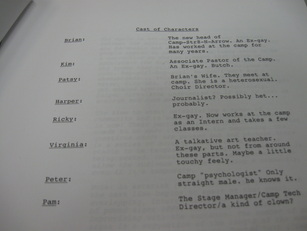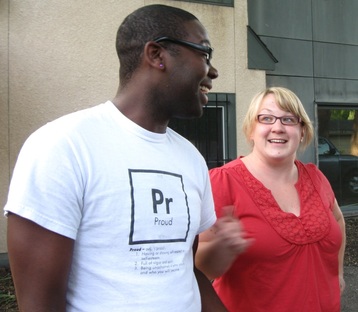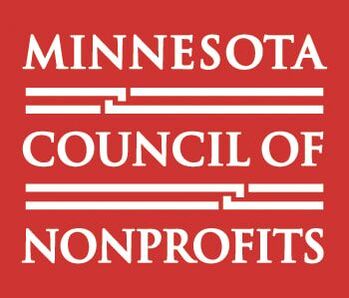|
This is the fifth post is a series of blogs about our upcoming production, Ex-Gays, written by Eric F. Avery. Ex-Gays will be presented at Matthews Park and Recreation Center opening July 15th. This blog is written by cast and company member Russ Dugger.
Some of you may remember a moment in Theatre History that (for a short time, at least) gripped our attentions and forced us to acknowledge and investigate how we perceive a performer's life and choices and connect them to their performance. A little over a year ago, Ramin Setoodeh, a writer for Newsweek stated that it is much more difficult for openly gay actors to play straight characters—and be taken seriously—then it is for known straight actors to do the reverse. “Most actors would tell you that the biographical details of their lives are beside the point. Except when they’re not.” Now, this little explosive moment in the theatrical world (see Kristin Chenoweth's comments to Newsweek to see just how explosive) was all but lost to the dark sweeping vortex that is my mind when a few weeks ago, I realized that I am portraying a gay man in Ex-Gays while I identify as heterosexual. All of a sudden I'm feeling a little more connected to Mr. Setoodeh's observations. It's not really my intention to blast Mr. Setoodeh's opinions, because they are just that. His opinions. But I can't help but get lost in what he wants us to glean from his piece. Are audiences incapable of seeing beyond homosexual stereotypes and suspending their disbelief for story's sake? Or are gay actors just too “queeny” to ever hope to be taken seriously as heterosexual characters? Since Mr. Setoodeh acknowledges that Rock Hudson in “Pillow Talk dissolves into a farce when you know the likes of his true bedmates.” I'm going to guess it's all up to the audience, but when he begins his piece remarking Sean Hayes' performance, it becomes a little less clear. “He comes off as wooden and insincere, as if he’s trying to hide something, which of course he is.” I realize how all of this is sooooooo last year. Literally. So let's bring this back to our little project. Ex-Gays is about people (gay and straight alike) attempting to cure homosexual urges and tendencies. I can't help but wonder how much it would change for the audience if they could look through the playbill and see how we identify ourselves in our bios; like seeing that little asterisk indicating we're part of some theatrical union. Would some of the language achieve a whole new level of harshness if it was known that the actor was actually gay? Could my heterosexual identity be blamed for a “wooden and insincere” performance? I believe that each audience member brings a fresh perspective to any performance. What I see is not what she sees, is not what he sees, is not what they see. And maybe we see a bad performance. Maybe it's because of an off night or bad direction. Anyone can have an opinion on the cause, but that doesn't always mean it's the correct cause for an entire group of people. We’ll take a week away from EX-GAYS and look toward next season. The Ravagers is coming in November, and creator Blake E. Bolan talks about working with SU while living outside the United States.
The story keeps changing. The questions change, and then the answers, and then the questions again. Working on The Ravagers with Savage Umbrella has truly been the longest artistic process I’ve been personally involved in, and feeling the story change in my mind and on paper as we add and subtract and push and pull each piece of the whole, it just feels so BIG. And it is big. In a lot of ways. It utilizes mythology of three different plays, two of which are missing. It’s an attempt to look at control in the modern world through something ancient. It’s based on a story with more than 100 people in it, and we want to actually include enough people to imagine the breath of 50 daughters filling a room. The play itself is complex enough to warrant us thinking about it in three parts. There’s Part 1 (a whole life), Part 2 (a wedding night), and Part 3 (what comes after). And the project is so big it has also been broken up into three parts. There was Phase 1 (simultaneous workshops in Minneapolis and Seoul), now there is Phase 2 (cross-continental script development), and soon there will be Phase 3 (staging this EPIC). (A note to the wary: I promise you this epic will feel epic but won’t last an epic amount of time. On my honor.) So it’s big in every way. Here is one of the many things that I love about Savage Umbrella: We get to dream big. For us, big doesn’t mean a big theater, or a big-name star. Big means a big idea, or a big story, or a big challenge. And when one of us gets scared, staring into the face of something so damned BIG, there are other people alongside us who dare to do the same, and keep us open to all the possibilities that are out there. We get to dream big because we allow ourselves to do so, and, in fact, encourage it. And so, I get to work on the biggest project of my life. And it’s scary. But it also fills me with awe, in the good way. There are so many incredible people working constantly to make this big thing work. SU has grown every minute that I’ve been away, and I’m sure it could have done that without any influence from me on the other side of the world. However, I think I’ve done my part to expand that range of possibilities of what we can do by being so far away and working with others to figure out how to utilize that distance to make us stronger. I feel lucky for what I’ve been able to accomplish for SU from so far, and that makes me excited for our future. I’ll tell you what, though. Distance does, in fact, make the heart grow fonder. I’m ready to see you, Savage Umbrella. And Minneapolis: get ready for The Ravagers. This is the fourth post in a series of blogs about our upcoming production, Ex-Gays, written by Tanner Curl. Ex-Gays will be presented at Matthews Park and Recreation Center opening July 15th.
I usually don’t dig on inspirational quotes. Often, they’re trite. Even more often, they’re fake. But sometimes I come across a quote that, even if it’s fake, makes so much sense to me, I have to scribble it down in a notebook or, in a true sign of belief, put it on my Facebook profile. One quote that has crossed the Eff-book Threshold of Awesomeness comes from George Bernard Shaw, “If you’re going to tell the truth, you better make them laugh; otherwise, they’ll kill you.” Even if ole Georgie B. Shaw-dawg didn’t say those exact words, I still dig the quote, because it so perfectly encapsulates what I think and love about satire. Remember the Tina Fey-as-Sarah Palin sketches on Saturday Night Live in 2008? They were great, and my favorite aspect about them was how they infused the script with actual quotes from the Real Sarah Palin. It can be funny to put ridiculous things in someone’s mouth to make them look ridiculous, but to put a real person’s real words in an impersonator’s mouth and see how truly ridiculous those words really are? Hilarious! Another example is Trey Parker and Matt Stone’s musical, The Book of Mormon. I listened to a Fresh Air interview with Parker and Stone, and they were asked about Mormons being a frequent focus of their movie and television work and how this has created the impression that they don’t like Mormons. To the contrary, Parker and Stone said, they think Mormons are nice people, but a lot of Mormon beliefs and attitudes are ripe for laughs. (You can check out The Book of Mormon performance from Sunday night’s Tony awards to see what I’m talking about.) So, when we started planning the marketing strategy for our summer production, Ex-Gays, and I was charged creating the website of Camp Str8-N-Arrow (the camp within the play that helps those poor, poor souls afflicted with homosexual attractions), I started researching actual camps that do this sort of work and looked at the language they use to describe their beliefs and mission statements. Some of them actually seem quite reasonable, at least on the surface. Take, for example, Love Won Out, which was founded by Rev. James Dobson’s Focus on the Family, but is currently run by Exodus International. While I expected a full fire-and-brimstone approach, I found their website surprisingly warm, complete with stock photos of confused, sad looking gay people, desperately looking how to live and love in a way that is God-approved. Of course, once you start looking below the promotional surface, you start to find holes in their rationale and their “science-based research.” And, even more disquieting, there is a stunning lack of information regarding the prevalence of depression and suicide among those “who struggle with unwanted same-sex attractions” and choose “to steward their impulses in a way that aligns with their faith convictions.” And then there are examples of ex-gay ministries that are so ridiculous and cartoonish, you feel like they have to be manufactured for comic effect. Meet, for example, Rev. Bradlee Dean of You Can Run But You Can’t Hide International. You might be familiar with Rev. Dean--last month, he received national attention for a speech he gave on the floor of the Minnesota House of Representatives, wherein he happened to mention that all U.S. presidents have been Christian...up until 2008. (Ugh.) Take a few minutes to peruse the good Rev. Dean’s website and read his words and beliefs and mission. You’ll have to laugh about it. You’ll have to make jokes. Otherwise, you’ll cry. This week's blogger, Eric F. Avery, talking about the genesis of Ex-Gays. Recently, I lost my iPod on the way to the airport. Yes, I'm dumb; I'm over it. On the device I kept music, checked my e-mail, managed my calendar, and countless other little tasks that people use their digital buddies for. With all of that: I can do without or find a new way. What's irreplaceable for me are ideas I had recorded for new works: Plays, concepts, images, characters, scenarios, structures, etc. Anytime I get an idea from my experience in the world I write it down. Simple. Early on in my training at the University of Kansas a professor told me that a theatre artist should always have 6 ideas for projects they want to do ready at all times. Why 6? I know not. These projects may develop while in waiting, come, go, combine, or actually find a way to production. Ex-Gays entered my project cue sometime in 2009 when two tracks for possible projects collided.  For years I have been wanting to create a character in the style of Revered Billy, ever since I took a short workshop with him in 2004. My primary interests in that were exploring religion, as well as creating a character driven piece that would interact directly with the audience. The other track was wanting to respond to a piece I heard on This American Life called "81 Words," about the journey of getting homosexuality removed from DSM. Eventually, I had the idea to make a character involved with the Ex-Gay movement as it would address feelings of those who opposed the DSM change, have a religious component, and provide many examples of possible structures for audience interaction. So with my initial idea intact I began to work on the character Pastor Brian. I began to find his voice, his physicality, his story, and not just in my imagination. I would improvise as Brian by myself, with friends, on the phone, and even occasionally with strangers. Quite soon after he started making sense to me I decided that a two person show would be the best fit, and after a series of conversations with trusted collaborator Laura Leffler-McCabe we set a workshop date for April 2010.  Developing new works is one of those areas in art where there are shared values with science. There are tried and true recipes and formulas to create, but to truly innovate one has to set into a laboratory and experiment. We rehearsed the show over the course of a week and put together a 40 minute workshop for a very modest audience of colleagues. It was time for me to return to Baltimore, so Laura and I took our data and began to analyze what we had done in April and what the next step was. Was the hypothesis valid? Have our initial calculations been on the mark? Should we return to the drawing board? The next part happened of the course a a few months, so for the sake of time I'll write a short play about what it was like. Laura: Eric, we are a growing company. I think we should have other people play these parts. Eric: But other people smell funny. Why can't we do it all? Like Barbara Streisand. Laura: You don't have the bone structure. Also, the piece will make more sense with more people, and we're going to have all of these fabulous new company members joining soon. Eric: Okay. I guess that makes sense. I’ll write; you direct? Laura: Maybe one of us should be it in... Eric: Okay. You. Laura: No, you. Eric: NO, you! Laura: Neither? Eric: Deal. See ya this summer! ….and here we are. A company of artists entering into the rehearsal process to discover a new work. It's exciting, terrifying, and all of those things that make art and life worth doing. To answer you initial question, Bobby, ideas come from everything. Always. It’s simply a matter of perceiving the world in a way that it inspires one to create. So put down your iPod. Carefully. And go experiment the world. Hey. Thanks for intro, Miss Laura. I’m Amber, a company member of SU.
We’re starting rehearsals for Ex-Gays on Sunday. If you’re not familiar with the ex-gays movement, give it a google. The Ex-Gays script is somewhere between a performance, improv, and satire. It's not just a theatrical event, but it will be a mix of performance genres. And here’s the deal. It’s also interactive. ...Still reading? I know. The term “interactive theatre” really sucks, right? It’s a Major. Bummer. It evokes a lot of assumptions. With interactive theatre, it’s like a bad childhood memory. You tried to go to the Renaissance festival when you were twelve and a village character engaged. Somehow you were forced into eating a turkey leg because you knew, with absolute assurance, that if you declined you’d be publicly humiliated in Shakopee, MN. It’s the same idea when saying the words “musical theatre.” For some artists, it really leaves a bad taste in their mouth. So instead of interactive theatre, let’s call Ex-Gays an open dialogue. Spectators will not be shoved into the spotlight, but may engage by choice, and participate in any level, from super involved (ask the actors questions during performance), slightly involved, (engaging with the person sitting next to you with a gesture), and not being involved at all. You choose. We promise not to hurt your ego or damage any reputation. We have a couple of ways we’re going to try and pull this off. So. Want to volunteer as a practice audience member? Or have you done a project like this before? What are your ideas to involve spectators? Let us know. Anyone can email us. Artists, spectators, bloggers, scientists, lovers, teachers, wanna-be’s, etc. Please feel welcome to read and follow up our posts with dialogue- ideas, ramblings, jokes, etc. Get under the umbrella. |
Archives
November 2020
|

 RSS Feed
RSS Feed




